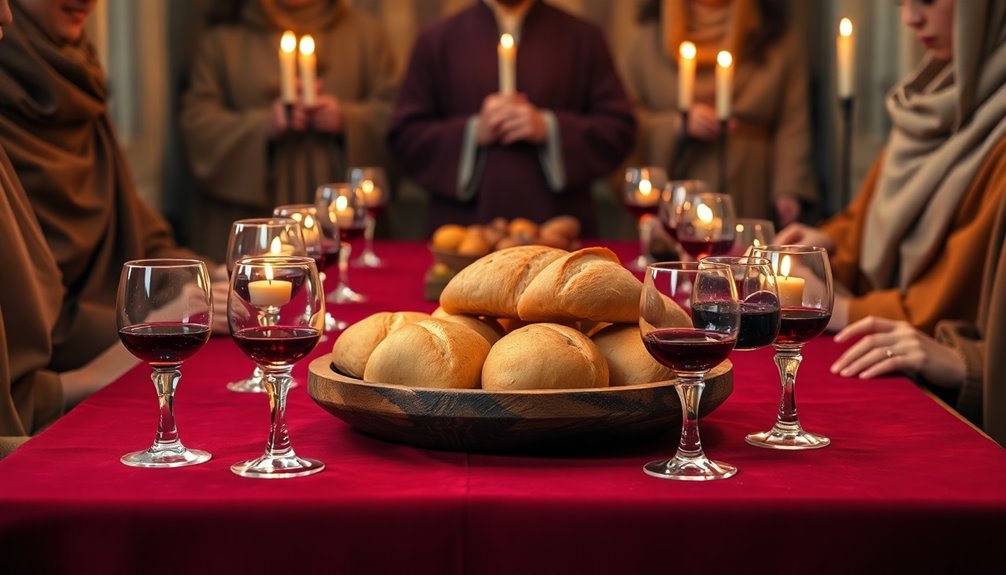When Jesus says, "My yoke is easy," He's inviting you into a partnership that makes life more manageable. This yoke symbolizes a shared responsibility, where burdens aren't just yours to carry alone. Instead of a heavy set of rules, as imposed by the Pharisees, He offers grace and support, leading you to find peace and rest. Embracing this yoke means prioritizing your relationship with Him over rigid obligations. It's an invitation to let go of stress and embrace fulfillment. Discovering how to live this out can lead you to deeper truths and a more enriching experience.
Key Takeaways
- Jesus' yoke symbolizes a manageable partnership, contrasting with the heavy burdens imposed by Pharisaic laws.
- Embracing Jesus' yoke offers spiritual rest and transformation instead of a burdensome checklist of rules.
- The invitation to rest in Matthew 11:28-30 underscores grace and support for the weary.
- Daily moments of stillness enhance connection with Jesus, fostering peace and clarity in life.
- Collective activities and shared experiences promote emotional balance and strengthen relationships through Jesus' grace.
Introduction

In today's fast-paced world, it's easy to feel overwhelmed by life's burdens, but there's a comforting invitation waiting for you in the words of Jesus: "my yoke is easy." This powerful phrase, rooted in Matthew 11:30, speaks to the heart of what it means to follow Christ.
When you think of a yoke, you might picture a heavy, constricting device, but Jesus offers a different perspective. His yoke symbolizes a partnership, where you can share your burdens with Him, contrasting sharply with the weighty demands of the Pharisees.
Jesus reassures you that His yoke is "easy," which in Greek conveys a sense of manageability and grace. Unlike the oppressive religious laws that can leave you feeling exhausted, His teachings invite you to find true rest.
When you come to Him, you discover a gentleness and humility that brings comfort to the weary.
Scriptural Insights on Rest

When you're feeling weary, Jesus invites you to find rest in Him, as seen in Matthew 11:28-30.
His gentle nature and the promise of manageable responsibilities offer a refreshing alternative to life's burdens.
Primary Bible References
Rest is a central theme in Scripture, particularly highlighted in Jesus' invitation found in Matthew 11:30, where He assures the weary that His yoke is easy. In contrast to the heavy burdens imposed by the Pharisees, Jesus offers a partnership that emphasizes grace and freedom. The Greek term "chrstos," meaning "easy," suggests that following Him isn't only manageable but also benevolent, providing relief from self-imposed demands.
This invitation to find rest isn't new; it echoes the Old Testament promise in Jeremiah 6:16, where God beckons His people to seek rest in Him. It's a call to return to a place of spiritual renewal and support.
The New Testament reinforces this idea, linking spiritual rest to the grace believers experience through faith in Christ, as seen in Philippians 4:13 and Hebrews 4:9-11.
When you embrace Jesus' easy yoke, you're not just lightening your load; you're stepping into a relationship that offers profound peace. This rest isn't merely physical; it's a deep, soul-refreshing promise that invites you to lay down your burdens and find true rest in Him.
Secondary Bible References
Embracing the biblical theme of rest, you'll find that secondary references throughout Scripture deepen your understanding of this divine promise. In Hebrews 4:9-11, the idea of a spiritual rest remains for the people of God, inviting you to enter this divine rest through faith. It's a reminder that peace and rest for your souls are attainable.
1 John 5:3 reinforces this by stating that following Jesus' commandments isn't a heavy burden; rather, His yoke is light and liberating. Psalm 55:22 encourages you to cast your burdens on the Lord, assuring you of His support and relief, echoing Jesus' invitation to rest.
Galatians 5:1 calls you to freedom, urging you to stand firm and not be burdened again by a yoke of slavery. This aligns with Jesus' promise of an easy yoke, contrasting sharply with the heavy burdens the Pharisees placed on others, as critiqued in Matthew 23:4.
Here, you'll see how Jesus' approach is rooted in grace and love, offering you true rest from the weight of life's demands.
First-Century Jewish Labor Practices

In first-century Jewish society, labor practices were deeply intertwined with religious observance and communal life. The Sabbath laws dictated that you rest from Friday evening until Saturday evening, creating a rhythm that shaped your workweek.
Farmers relied on oxen to plow their fields, with the yoke symbolizing the burdens of agricultural life, requiring a strong partnership between you and your animals.
The concept of a "yoke" also extended to religious obligations. The Pharisees imposed numerous regulations that many found heavy laden and burdensome. This contrast highlights the simplicity of the yoke of Jesus, which he described as easy to bear, offering a refreshing perspective amidst strict legalism.
In trades like carpentry and fishing, apprenticeships were common, allowing the younger generation to learn under a master. This mentorship mirrored the yoke imagery, emphasizing guidance and support.
Additionally, family labor in agrarian settings fostered a communal approach, enabling shared burdens and collective effort.
Through these practices, you can see how labor wasn't just about work, but also about faith, community, and the pursuit of a lighter burden in daily life.
Cultural Context of Yokes

Labor practices in first-century Jewish society offer a backdrop for understanding the cultural significance of yokes. In ancient times, a yoke connected two oxen for plowing, symbolizing partnership and shared responsibility. This cooperative spirit reflects how people viewed their obligations, both socially and religiously.
However, yokes also represented the heavy burdens imposed by religious laws, especially those enforced by the Pharisees. These laws often felt oppressive, leading many to yearn for relief from such strict commandments.
A well-fitted yoke reduced strain and allowed for easier movement, paralleling Jesus' invitation to adopt a more manageable spiritual burden. He contrasts the heavy yoke of rigid law with a lighter, grace-filled approach to faith.
In rabbinic literature, yokes are metaphorically linked to the acceptance of the Torah, emphasizing the weight of obligations that believers felt.
Through this lens, you can see how yokes symbolize not just physical labor but the emotional and spiritual burdens people carried. Understanding this cultural context enriches your appreciation of Jesus' message, inviting you to find freedom from oppressive expectations while still embracing community ties and responsibilities.
Misunderstanding the Yoke's Purpose

You might think of Jesus' yoke as just another set of burdensome rules, but that's a common misconception.
Instead of feeling weighed down, His invitation is to experience true spiritual rest through a supportive partnership.
Let's unpack why this misunderstanding can keep you from embracing the freedom and grace that come with following Him.
Debunk Common Misconceptions
While many see the yoke as just another burden to bear, it actually represents a partnership with Jesus, designed to provide support and guidance. Misunderstandings arise when you equate following Him with a life of rigid rules, making it feel burdensome. However, Jesus invites you to take on His yoke, which is described as "easy" and "light" in Matthew 11:30. This contrasts sharply with the heavy demands of religious legalism that can leave you feeling exhausted and inadequate.
When you embrace Jesus' yoke, you're not signing up for a life filled with endless toil. Instead, you're stepping into a relationship that emphasizes grace and inner transformation. It's a call to learn from Him, characterized by humility and rest rather than striving for self-righteousness.
Recognizing the yoke as a means of spiritual rest can help dispel the notion that faith requires constant effort. In this partnership, you find freedom and grace, allowing you to experience a deeper, more fulfilling relationship with Christ.
Skepticism About Spiritual Rest
Skepticism about spiritual rest often stems from a misunderstanding of Jesus' yoke and its intended purpose. Many people falsely equate following Christ with a burdensome list of rules and regulations, often shaped by legalistic interpretations of faith. Instead of viewing His teachings as liberating, some see them as a call for increased discipline and self-righteousness.
Jesus invites you to "learn from me," emphasizing His gentleness and humility, which should make spiritual rest feel attainable. However, if you're accustomed to a heavy yoke—like the over 600 regulations imposed by the Pharisees—you might struggle to embrace the true meaning of His easy yoke. This misinterpretation can lead to doubt about whether spiritual rest is genuine or just an idealistic concept.
It's crucial to recognize that Jesus offers grace and transformation rather than a burdensome checklist. By letting go of preconceived notions of spirituality that prioritize self-effort, you can embrace the refreshing nature of His invitation.
Understanding the easy yoke helps you experience the spiritual rest that comes from a relationship with Christ, free from the weight of endless obligations.
Daily Moments of Stillness

Taking time for quiet reflection each day helps you connect with the peace Jesus offers, easing the burdens you face.
Whether you find stillness alone or engage in group restorative activities, these moments can deepen your spiritual intimacy and clarity.
Embracing stillness not only nurtures your faith but also helps you listen for God's guidance in your life.
Quiet Time for Reflection
Finding quiet time for reflection can transform your spiritual journey, allowing you to connect more deeply with God. When you set aside dedicated moments for stillness, you create space to meditate on scripture and discern His guidance in your life. This practice enhances your understanding of biblical teachings and fosters spiritual growth.
Engaging in daily quiet time isn't just beneficial for your soul; it can also reduce stress and anxiety, promoting mental and emotional well-being. As you embrace mindfulness in faith, you'll notice a significant shift in your overall peace. Regular reflection cultivates a habit of prayer, enhancing your communication with God and allowing you to listen for the Holy Spirit's leading.
Incorporating silence and solitude into your routine aligns your heart with God's will and purpose. These moments of stillness invite clarity and direction, making it easier for you to follow His path.
Group Restorative Activities
Engaging in group restorative activities can significantly enhance your moments of stillness, allowing you to share the journey of mindfulness with others. When you participate in guided meditation sessions or gentle yoga classes, you create a supportive environment where everyone feels connected. These activities remind you that your burden is light, especially when you're surrounded by those who share similar intentions.
Taking just 5-10 minutes for quiet reflection in a group setting can lead to improved focus and emotional resilience. You'll find that the collective energy fosters a sense of calm, helping you reconnect with your inner peace. The act of engaging in these daily moments of stillness not only nurtures your own well-being but also strengthens social bonds, allowing you to feel humble in heart.
Establishing a routine that includes these group restorative activities can significantly enhance your life. As you embrace stillness together, you'll cultivate a deeper awareness of yourself and your surroundings. This shared experience promotes emotional regulation, making it easier to navigate life's challenges. Additionally, incorporating consistent daily routines can further support emotional well-being and reduce anxiety.
Restoring Balance in Life

How can one truly restore balance in life amidst the chaos of daily responsibilities? Embracing the yoke offered by Jesus can be a game-changer. His teachings emphasize humility and gentleness, which help you alleviate the burdens of self-righteousness and legalism.
By accepting this light yoke, you can find peace and rest, counteracting the stress that often overwhelms you. Instead of being weighed down by societal expectations or rigid religious rituals, focus on prioritizing your relationship with God and others.
This shift allows you to cultivate a fulfilling existence, where grace replaces the heavy load of overbearing rules. When you follow Jesus' teachings, you learn to maintain emotional and spiritual balance, navigating life's demands with greater ease.
Additional Resources

Exploring additional resources can enrich your understanding of Jesus' invitation to take on His easy yoke. Websites like BibleGateway.com offer a treasure trove of tools, including devotionals and reading plans that focus on themes surrounding His call for you to embrace His easy yoke and light burden.
You can dive into various commentaries, like Ellicott's and Pulpit Commentary, which unpack the theological nuances of this teaching, emphasizing the balance between work and spiritual rest.
Comparing different translations, such as the NIV, ESV, and KJV, allows you to see how each interprets Jesus' message about His yoke. This can deepen your grasp of the love of God in this context. Engaging in community features, like forums and discussion boards, lets you share insights and interpretations with others, enhancing your Bible study experience.
Additionally, access to scholarly articles provides reflections on the yoke of Jesus, shedding light on its spiritual implications and practical applications in your daily life.
Frequently Asked Questions
What Does It Mean When a Yoke Is Easy?
When a yoke is described as easy, it means that the demands or responsibilities associated with it are manageable and supportive.
You're not weighed down by excessive burdens; instead, it promotes a sense of partnership and guidance.
An easy yoke allows you to navigate life's challenges with grace, providing you with the strength and encouragement needed to grow spiritually, rather than feeling oppressed by rigid rules or expectations.
What Is the Paradox of the Easy Yoke?
The paradox of the easy yoke lies in how you perceive burdens. While following Jesus might seem demanding, it actually offers relief from the heavy expectations of religious rules.
Instead of feeling weighed down, you'll find that embracing His teachings leads to genuine freedom and support. The responsibilities you take on can feel manageable, empowering you to grow spiritually in an environment filled with grace, not guilt.
It's about transforming your relationship with faith.
When My Yoke Is Easy and My Burden Is Light?
When you find your yoke easy and your burden light, you experience a profound sense of relief and freedom.
Life's pressures seem less daunting as you embrace grace over legalism. You're invited to let go of heavy expectations and instead focus on inner transformation through faith.
This shift allows you to feel supported and rejuvenated, guiding you toward a path of peace and purpose, making your journey lighter and more fulfilling.
What Is a Yoke Spiritually?
A yoke spiritually symbolizes your submission to a higher purpose and partnership in faith.
It represents the responsibilities you share with Christ, emphasizing His teachings and guidance.
When you embrace this yoke, you find that it helps lighten your burdens and offers a sense of spiritual freedom.
Rather than feeling weighed down by strict rules, you experience grace and support, allowing you to grow in your relationship with God and live a fulfilling life.










